Israel-Kurdistan: New Middle Eastern Alliance
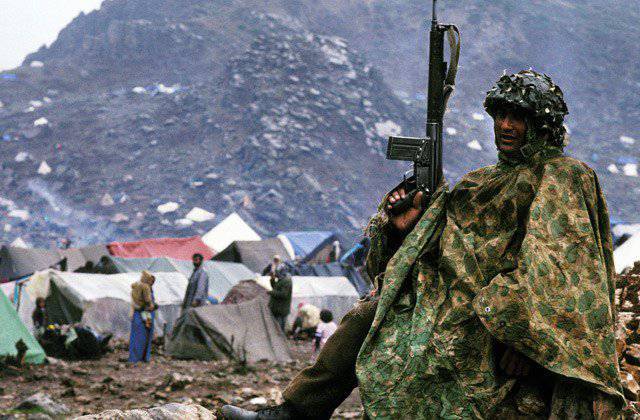
The Kurds have always been the natural allies of the Jews; today they are united by a common enemy - fundamentalist Islam
Israel and the Kurds are “doomed” to cooperate. The basis of this is a century of mutual friendship, the similar fate of outcasts, the hatred of neighbors, and most importantly, the deadly common enemy in the face of fundamentalist Islam.
The train will not go further ...
... In the morning, 31 of May 2007, in the Turkish province of Bingel, a powerful explosion thundered: a train that flew from Iran to Syria flew down the slope.
Arriving on the scene, the Turkish police found the wrecked cars, and in them an unexpected load - tons of ammunition, rocket launcher, 300 missiles, machine guns, machine guns and ammunition.
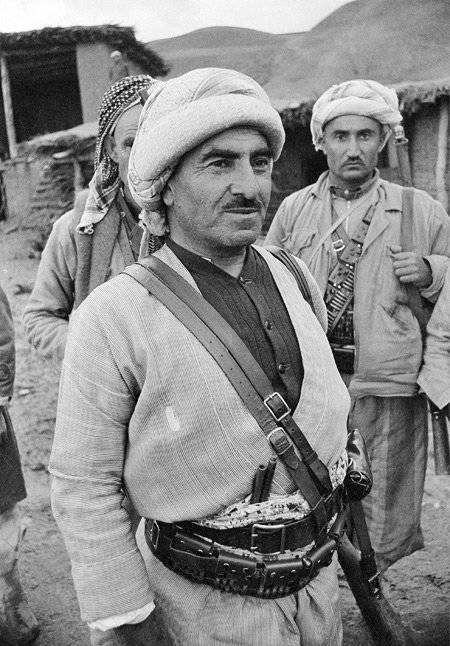
According to the official version, the train was blown up by Kurdish separatists. The question of why the Kurdish separatists had not attacked the freight trains before that time had to blow up the train, and how did they know that there were weaponremains open. However, reports began to circulate in the Turkish media that these coincidences were by no means accidental. The train carried weapons to Lebanon, and not just to Lebanon, but to Hezbollah. But the Kurds did not sabotage at random, but according to the “prompting” of the Israeli special services - the “Mossad”. And not for “just like that,” but for military assistance and intelligence information.
More about this stories the world has never learned anything, as he knows practically nothing about the tacit alliance between the two "outcasts" of the Middle East - Israel and the Kurds.
Meanwhile, this alliance, hidden from the views of external observers, increasingly determines the course of the recent history of the Middle East.
Memory and pain: victims of hatred and betrayal
The basis of trust between nations is largely laid by the history of their relations. In our case, this story is not marked by any injuries or mutual insults. Before the rise of Israel, more than 20 of thousands of Jews lived in Iraq, concentrating mainly in Kirkuk, Mosul, Sulaymaniyah and Erbil; in Iran - about 12 thousands. Historians believe that among Kurdish Jews there are many descendants of proselytes - residents of the kingdom of Adiaben (the area of present-day Erbil), who adopted in the 1st century AD Judaism.
True or not, in any case, the Jews of Kurdistan existed in peace and prosperity, which most of their relatives could envy, not only in Europe, but also among Arabs. They practically did not know harassment, pogroms and bullying; they were not forced, as in many Christian countries and states of the Caliphate, to wear demeaning bandages, they were not locked up in the ghetto and were not bullied by slander. There were immutable rules between the leaders of the Kurdish clans and the Jewish communities, which were strictly observed from generation to generation: Jews are under the patronage of Kurdish princes, and in exchange provide them with unquestioning support. It was not only vassal, but friendly and even family relations. It is known that the largest Kurdish leaders favored the Jews and even entered into dynastic unions with them. Influential Jewish merchants sometimes acted as mediators in resolving conflicts between the Ottomans and Kurdish tribal leaders, while the sheikhs of the most influential Barzani clan had close friendship with the patriarch of the Jewish community of Eliyahu Havaj Kinno.
The rabbis in Baghdad in the XVII-XVIII centuries were the descendants of the Barzani-Adoni family, and in Mosul - even in the XX century. These special relationships were carefully fostered by both parties and are preserved today, having survived many trials. The family of Eliyahu Kinno supported the mustafa Barzani’s mall, who was trying to create a Kurdish national state - the Mekhabad Republic - in 1946 (it lasted less than a year).
After the creation of Israel, the Jews were thrown out by a wave of Arab nationalism from countries where they lived for thousands of years. They were forced to leave and Kurdistan, which became part of Iraq, but their departure, unlike their counterparts in the Middle East - from Yemen to Morocco - did not become a painful ordeal, not accompanied by pogroms, extortion, or deprivation of property. Moreover, Jewish refugees from Kurdistan reported that Kurdish clans helped and supported the refugees.
However, the Kurds themselves were in a situation no less disastrous than the Jews. They could not resist the Arab revival and turned into a rogue nation, deprived of their country, divided between four states: Iraq, Iran, Syria and Turkey. And if the Jews were simply expelled from their countries of residence, the Kurds were turned into second-rate people, "Jews of the Middle East."
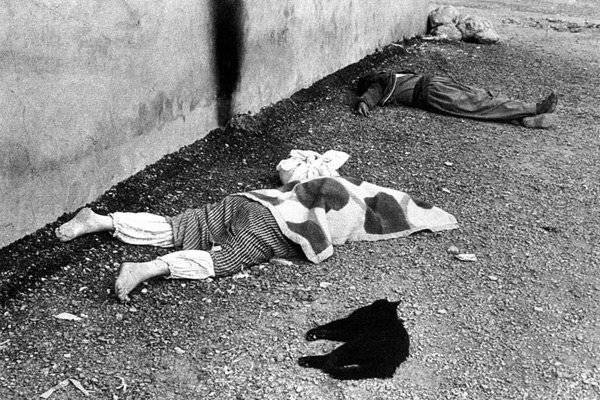
Their attempts to gain independence were ruthlessly suppressed by the Turks, Saddam Hussein and Assad, and the Anfal operation to exterminate the Kurds with chemical weapons, led by Saddam’s brother, Ali Hassan al-Majid, nicknamed Ali Ali, they themselves called the “Kurdish Holocaust”. Then, in May, 1987, in the province of Erbil, then - in the south of Sulaymaniyah and in the regions of Yakhsomer and Halabja, was destroyed by bombs with yperite, sarin and herd about 200 thousands of Kurds. Another 700 thousand were taken to temporary camps. Villages and even large cities (the city of Kala-Diza, for example, with an 70-thousandth population) were obliterated. There was nowhere to hide, it was impossible to run, because roads blocked by special forces troops. Gas trailed on the ground, and children were the first to die from it. As in the case of the Jews, the international community pretended that nothing was happening.
Both nations became victims of political manipulation and betrayal of the West. As the Jews were betrayed by the British in the 30-40 of the last century, so the Kurds were given to London to be torn apart by their neighbors, although they were promised independence. Oil and Arab nationalism proved stronger than the gentlemen’s code of honor. And just as the British provided all possible assistance (albeit unsuccessful) to the Jordanian legion in the 1948 war of the year against Israel, they also helped the Iraqis to settle scores with the rebel Kurds.
This ominous analogy played a significant role in bringing the two ancient peoples together: they both realized that they were hated by the Arab environment, that they should not pin their hopes on the civilized world, and that weapons are the only way to protect their people and their future.
Honey and tar
The doctrine of Ben-Gurion, the first Israeli prime minister and the founding father of the Jewish state, was based on the idea that a lonely and isolated Israel should seek allies on the periphery of the Arab world. The Kurds, like no one else, approached this role. In 50, the well-known right-wing politician Rehavam "Gandhi" Zeevi was an active supporter of rapprochement with the Kurds.
With 60-70, Israel establishes a relationship of trust with the leaders of the Kurdish clans in Iraq. According to the ex-Mossad agent Eliezar Zafrir, Israeli military advisers at the headquarters of Molla Mustafa Barzani (father of the current leader of the Kurds, President of the semi-autonomous Kurdish Regional Government Massoud Barzani) trained Kurdish forces in 1963-75 years, supplied them with weapons and air defense systems . Some time ago, Israeli TV in a report on Kurdish-Israeli relations showed pictures taken in 60's. On them, Mustafa Barzani was captured standing in an embrace with Moshe Dayan - the legendary Israeli commander. It is known that the officer of the "Mossad" Sagi Chori was not only the closest aide of Barzani Sr., but also his close friend, and participated in the military actions of the Kurds against the Iraqi army in the 60-s.
In 1980, Menachem Begin publicly admitted that Israel provided the Kurds with not only humanitarian aid, but also military aid, sending advisers and providing weapons.
Collaboration goes to the diplomatic level and becomes truly invaluable for the Kurds at the moment of mortal danger for them - Operation Storm in the Desert in 1991. Having suffered a shameful defeat, Saddam brought down all the power of his repressive apparatus on recalcitrant groups of the population: the Shiites and Kurds. The United States did not interfere with the actions of the tyrant, who was driven back into the cell, but did not want to be physically eliminated, and in the air again pulled, as during Operation Anfal, with sarin.
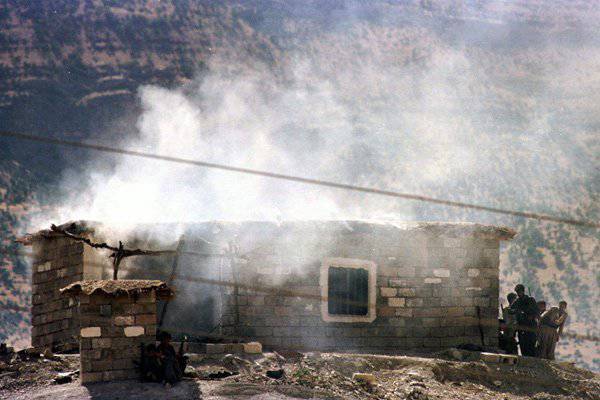
Forced to fight for physical survival, the “butcher” in Baghdad lost the last remnants of prudence. The Republican Guard advanced to the borders of Kurdistan, and the punitive units captured Suleymaniyah. Kurds threatened genocide, almost two million people left Kirkuk, Erbil and Sulaymaniyah. At that moment, official Jerusalem defended its allies. Jewish organizations, with the participation of the Israeli government, actively lobbied for Kurdish interests; Israel, through Turkey, began to supply humanitarian aid to the Kurds, and Prime Minister Yitzhak Shamir openly called upon the meeting with Secretary of State James Baker to stand up for the Kurds. The fact that, at the end of the day, the United States and its allies decided not too eagerly to declare Iraqi Kurdistan (the territory north of the 36 th parallel) a closed zone was not the least achievement of Israel.
However, not everything and not always was smooth in the relationship between old friends. In 1999, the friendship was overshadowed by Israel’s decision to extradite the leader of the Kurdish Workers Party, Abdullah Ocalan, to Turkey. Turkey was viewed by Israel as a powerful strategic ally, and, indeed, at that time was such - relations with the Kurds were first sacrificed to geopolitical considerations.
In February 1999, Öcalan, with the participation of the “Mossad”, was abducted by Turkish special services from Kenya, and the role of Israel became “a fly in the ointment”, which for some time poisoned the relations between the partners. A wave of mass protests of Kurds swept through European cities, and in Berlin, where a significant Kurdish community lives, angry protesters even tried to storm the Israeli embassy.
It took several years before the wound inflicted on the Kurds was healed, and the old sympathies and mutual interests prevailed over the insult. Already in 2004, Israeli media reported on unofficial contacts between the Kurds of Iraq and the Mossad. Some time passed, and Massoud Barzani, leader of the Kurdistan Democratic Party and head of the Patriotic Union of Kurdistan, Jalal Talabani (now Iraqi President) on the one hand, and Israeli Prime Minister Ariel Sharon, on the other, publicly reaffirmed their commitment to traditional friendship between the two peoples.
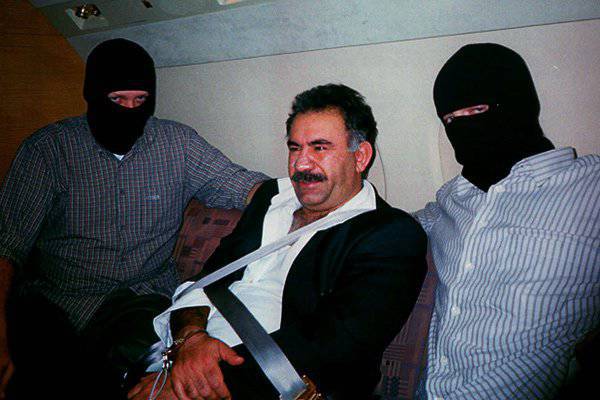
The Kurds did not hide the fact that they consider Israel as a strategic partner. In June, 2005, Masoud Barzani stated that he sees no obstacles to the establishment of diplomatic relations with Israel. “The relationship between the Kurds and Israel is not a crime, especially since many Arab countries maintain contact with the Jewish state,” he said in an interview with Saudi El-Hayat.
Kurdistan's Invisible Wars
However, despite the public statements, none of the parties was going to reveal the cards. How, where and to what degree both parties cooperate remains a mystery, and what is known is not even the tip of the iceberg, but only a grain of it. According to the Western media, Israeli instructors of the Mystarvim special forces (“pseudo-Arabs”) train the Kurdish militia “Peshmerga” in Iraqi Kurdistan (from 50 to 75 thousands of fighters), hand over weapons to the Kurds and simultaneously track the main enemy from the Kurdish territory - Iran. The task of the allies is facilitated by the presence of a large community of Kurdish Jews in Israel who know the language and customs of the Kurds.
In 2004, an American journalist Seymour Hersh claimed in an article in New Yorker that the Israelis had formed Kurdish special forces capable of gathering intelligence, sabotage and special operations in Iraq, Iran and Syria. The sabotage of Iranian nuclear facilities, he argued, was the work of Mossad and the Kurdish special forces he had trained.
Hersh, referring to anonymous sources, wrote that the decision on a qualitative increase in aid "Peshmerga" was made in Jerusalem after the failure of the US efforts to create a stable and democratic Iraq on the ruins of the dictatorship of Saddam. It was obvious that Iraq was increasingly drawing into the sphere of influence of Tehran, and this prompted Israel to more actively join the "big game" on the side of the Kurds. In September 2006, a similar report was broadcast on the BBC.
Naturally, Iran and Turkey show no less interest in Iraqi Kurdistan than Israel. How ruthless and unrelenting this secret war in Kurdistan is, one can only guess from the individual messages coming from this region.
In August, 2011, the Iranians said that they have data on the establishment of bases for unmanned aerial aircraft in Kurdistan. One of them is allegedly located in the vicinity of Kirkuk, the other - at the airport of Mosul. They are served, according to Tehran, by Israeli experts, who also train Kurdish personnel. There was no comment from either Israel or the Kurdish authorities.
In January 2012, similar information appeared in the Turkish newspaper Zaman - this time it was about the collection of Israeli drones intelligence in the Turkish provinces of Hatay and Adana. The newspaper claimed that these data are being passed on to the leadership of the military units of the PKK, which, according to Zaman journalists, "is now well aware of the 'vulnerabilities' of the Turkish army."
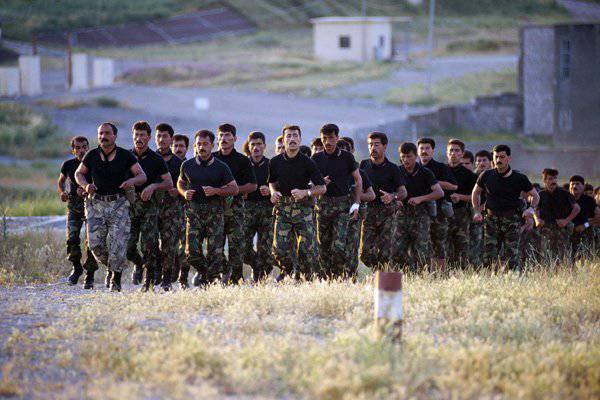
The Turkish media, citing "sources" in the special services of their country, reported that one of the leaders of the Kurdish Workers Party, Kenan Yeldizbakan, who attacked the Turkish Navy base in Iskandrun, repeatedly visited Israel.
In May, 2012, Iranian media reported that there was a Mossad base in Iraqi Kurdistan, at the junction of the borders with Syria and Iran. This time, the government of the Kurdish regional government demanded evidence from Tehran. No evidence followed.
In June of the same year, in Suleymaniyah, Mawlud Afand, editor of the journal published by the Kurdish-Israeli Institute, disappeared without a trace. According to Diyari Mohammed, a journalist, his boss was abducted by Iranian intelligence services. However, it is possible that this abduction was the work of the Mossad, since shortly before the disappearance, Afand sharply criticized Israel for the supply of weapons to Turkey.
Cooperation in the civil sphere is less classified, but we don’t know much about it. For example, according to a JSS Jewish news site in France, in June 2010, Iraqi Kurdistan was secretly visited by Idan Ofer, chairman of the board of directors of Hevra-le-Israel, who met with leading Kurdish politicians and businessmen, including Kurdistan’s Vice President Kosrat Rasul and with the Prime Minister of Kurdistan Barham Saleh. The main topics were Israeli investments in the Kurdish oil industry, construction of an oil refinery in Kirkuk and the development of Israeli-Kurdish relations, especially in the context of deteriorating relations with Turkey.
In February 2013, the Israeli newspaper Yediot Akhranot reported that a Kurdish delegation visited Israel, considering the possibility of purchasing equipment for dairy farms. It was headed by "not the last people" - the Minister of Agriculture and the Vice-President of Kurdistan.
According to Yediot Ahranot, the Kurds are going to use the Israeli experience and assistance of Israeli specialists to build the largest dairy plant in Iraq. But here, the details of the project are left out of the box.
Israeli branch of Motorola Inc. and Magalcom Communications and Computers have signed contracts with the Kurdish government for hundreds of millions of dollars, including the construction of a modern airport in Erbil. Among the consultants were prominent military and political figures in Israel, in particular, the former head of the Mosad, Dani Yatom.
In Iraqi Kurdistan, you can find hundreds of products for various purposes labeled “made in Israel”: motorcycles, tractors, body armor, ambulances and even modernized Kalashnikov assault rifles.
Speaking about the relations between the Kurds and Israel, one should first of all realize that it is not just a warm relationship or a tactical alliance, but a strategic partnership that both parties need more than ever. For they are well aware that today they are confronted by an enemy that is much more merciless and bloodthirsty than all previous ones, and the fight against it is going to life and death. The name of this enemy is fundamentalist Islam.
Before the onslaught of the Caliphate
There is no need to say how radical Islamism is dangerous for Israel, but it is no less threatening to the Kurds.
The Kurds are Sunni Muslims, but Islam, which they profess, has never been either dogmatic or fundamentalist. The rather formal and superficial observance of religious codes was traditionally combined with ancient clan traditions. There was no room for exaltation, excessive zeal in the face of fanaticism, and a desire to literally interpret all the precepts of the Koran and the Hadith. But there was a very strong sense of national identity and pride in their culture, which had nothing to do with either Arab or Persian or Turkish, but was self-sufficient, integral and rooted in history. All the attempts of the Arabs to plant militant Islam here were perceived and perceived as dictates of an alien imperial culture, and rejected. For this reason, all versions of Islamic Sunni fundamentalism are not popular among the Kurds: the Muslim Brotherhood, the Salafi (Wahhabis), and the followers of Al-Qaida.
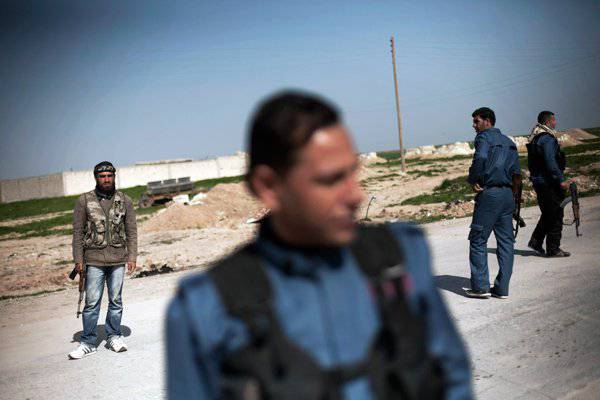
You should know the specifics of the Middle East to understand what is at stake. For Muslim Brothers, just being a Sunni is not enough; the Arabs in their value system are the only true Muslims who rise above the rest of the Sunnis, not to mention the Shiite sectarians. Religious intolerance is superimposed on the voice of blood.
Not Arabs, even if they are Sunni, should abandon their culture, language, traditions and identity in the name of genuine Islam, that is, become Arabs in everything. For Kurds, this is totally unacceptable. In a sense, they are the successors of the ancient Sumerians, Assyrians and Babylonians, who, despite wars, cruelty and violence, were tolerant to foreign religions and cultures, not trying to "subjugate" the soul of the conquered peoples. This explains the fact that the Kurds never oppressed the minority groups among them (unless they rebelled): Jews, Assyrian Christians, Shiites, etc.
Attempts by the Islamists to impose fundamentalist Islam in Iraq and Syria on the Kurds face an unusually harsh reaction, and, given the independent and militant nature of the Kurds, they end in exile of the Islamists. This happened recently in northern Syria, where last year the Kurdish militia during the fierce fighting beat Islamists out of their villages from Jabhat al-Nusra and the Islamic State of Iraq and the Levant.
The Asadov clan regime (Hafez, and then Bashar) used to beat the Kurds and in every way suppressed their freedoms, turning them into second-class citizens in their own country. However, in the case of the Islamists, in Iraq and Syria, the case is not limited to discrimination - this is an attempt to physically and spiritually destroy the Kurdish civilization, and this danger is incomparably greater. Natural minorities of the Kurds are the remaining minorities - first of all, Christians and Druze, as well as Israel, for which the Islamic wave harbors a deadly threat to existence.
Choice in no choice
The second common enemy of the Kurds and Israel, although not as obvious as the Arab Islamists, is Turkey. Ankara does not want and cannot allow the creation of a Kurdish state in Iraqi and Syrian Kurdistan, since the next step will be claims to Kurdish provinces in south-eastern Turkey. And that means the collapse of the country. It is not surprising that the Minister of Foreign Affairs of Turkey, Ahmed Davitoglu, has already said “about the inadmissibility of any declaration on the creation of an autonomous (because, Kurdish) education in Syria, since this will trigger a new crisis. ”
At the same time, Turkey is no longer a strategic partner of Israel. Trade cooperation between the countries continues, but relations have long been poisoned by provocations and the militant demagogy of Erdogan. The ruling Islamist Justice and Development Party is trying to earn points on anti-Israeli rhetoric and encourages Jerusalem to create a kind of sanitary cordon around Turkey with its neo-Ottoman ambitions and growing appetites. Neighboring Christian countries in Turkey in the Balkans (Greece, Bulgaria, Romania) and Cyprus (we don’t have to talk about Armenia) know firsthand about Turkish sovereignty and its attendant “charms”, and willingly cooperate with Israel. Kurdistan may, according to the logic of events, become the missing link that will close the entourage of Turkey in the south-east.
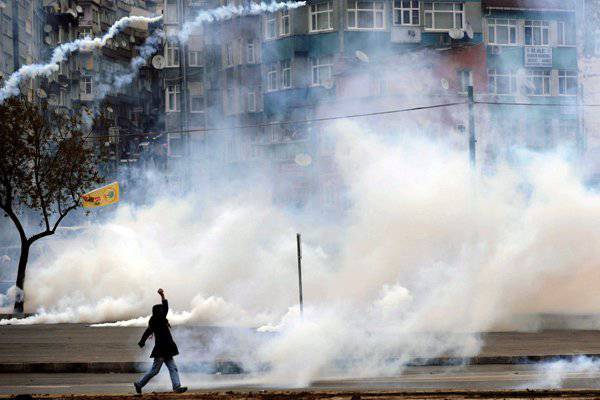
The fact that the interests of both parties coincide, it is impossible to hide. The former director general of the Ministry of Foreign Affairs of Israel, Alon Liel, said that Israel would support the creation of a Kurdish state in the event of the collapse of Iraq.
In February of this year, one of the leaders of the Kurdish Workers Party, Zubeir Aydar, called for an closer rapprochement with Israel in an interview with The Jerusalem Post, stressing that "the Kurds are on their way to a sovereign state."
According to Kurdish journalist Ayub Nuri, “Kurds deeply sympathize with Israel, and an independent Kurdistan will be a blessing for Israel. This will create a balance of power in the region.
For now, Israel alone stands against many enemies. With the creation of an independent Kurdistan, he, firstly, will find a true friend, and, secondly, Kurdistan will become a buffer zone between him, on the one hand, and Turkey, Iraq and Iran, on the other. ”
Selam Saadi, editor-in-chief of the Kurdish Rudaw news, is convinced that “the Kurds are the only people in the region who do not hate either Israel or America. The Kurds see the world around us differently than the Arabs. In the Arab world, Islamists seeking to create a Sharia state are gaining more and more influence, but most Kurds believe in the European model of government. ”
“The Kurds have never been opposed to Israel,” agreed Maurice Amitai, who lobbied for Israeli interests in the United States and maintained contact with Kurdish leaders for 30 years. “Israelis have always valued friendship with the Kurds.”
The peoples, bound by the friendship going deep into the past and having suffered tremendously in their striving for independence, are “doomed” to union. Both are isolated in the hostile Arab world around them. Both have the strength and resources to complement each other: Israeli technological and military achievements, coupled with the strength and resilience of the 35 million-strong Kurdish people, are able to create an alliance that cannot be resisted by Arabs, Iranians or even Turks. Israel is an island of stability and prosperity in the Middle East; Iraqi Kurdistan, with its booming economy and Western investments, remains a bastion of stability in a sea of chaos that has swept the Arab world.
This does not mean that relations between the two nations are cloudless. The Kurds are forced to reckon with their powerful neighbors - Iran and Turkey; Israel cannot fail to take into account the opinion of the “elder brother” in Washington, where they do not welcome the creation of a Kurdish state. The Kurds are fragmented, and the civil war between them in the 90-ies showed how great the centrifugal forces are here. Israeli policy, in turn, is by no means monolithic, and there are many supporters of the pacification of Turkey, despite the apparent hostility of Erdogan.
However, given the chain reaction of disintegration in the region and its violent Islamization, both nations have no choice but to unite efforts — the rest of the minorities of the Middle East, in particular, Christians, can join them, but they will not change the balance of forces.
Information